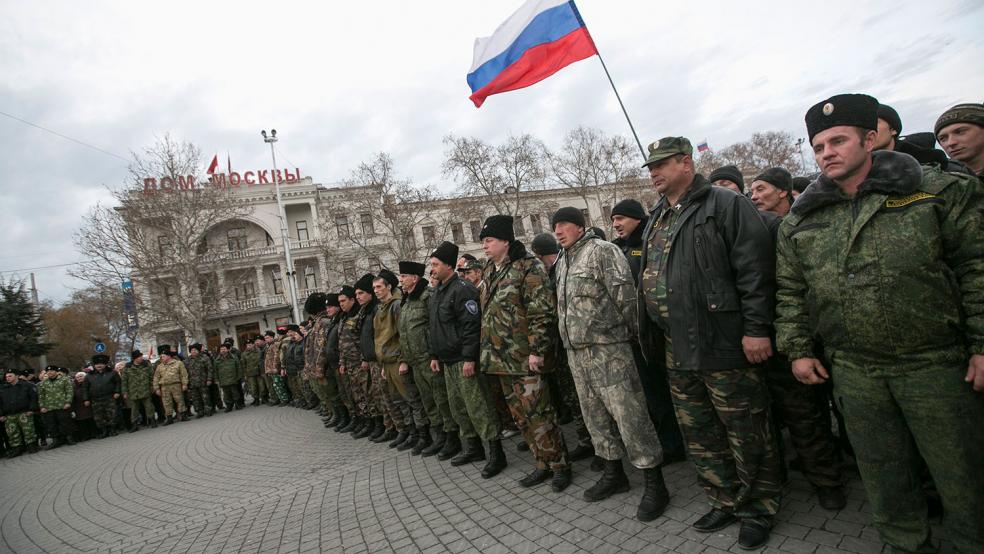The bipartisan checklist for helping Ukraine: Impose sanctions against the Russians? Check. Provide loan guarantees to the struggling new Ukrainian government? Check. Implement reforms at the International Monetary Fund? Not so fast.
For a brief time, it looked as if irate Democrats and Republicans would pull together to respond to Russian President Vladimir Putin’s invasion of the Crimean peninsula of Ukraine. But Republican opposition to the IMF, a lending institution designed to help countries like Ukraine in need of financial assistance, is becoming the main stumbling block in congressional efforts to craft an aid package to the Eastern European nation.
Related: The Two Ukraines Portend a Disastrous Possibility
The Senate Foreign Relations Committee on Wednesday advanced a comprehensive aid package to Ukraine that in addition to placing sanctions on Russians involved in the Ukraine crisis, authorizes as much as $150 million in assistance, and doubles the U.S. contribution to the IMF from $63 billion to $126 billion. That increase would be offset by a $63 billion reduction to a separate IMF account.
The changes would draw down a temporary IMF account used for emergencies and bolster the lender’s general loan pool. While doing so would weaken U.S. influence at the IMF, it wouldn’t affect its veto power.
Some Republicans say the administration is taking advantage of the crisis in Ukraine to push through the IMF changes. “This IMF money isn't necessary for dealing with this Ukraine crisis that we see today,” House Speaker John Boehner (R-OH) said on Wednesday.
Democrats, including administration officials, disagree. “It’s only through the IMF, a reformed IMF, that Ukraine is going to get the help it needs to stand on its own two feet,” Secretary of State John Kerry told the House Appropriations Committee this week.
Related: Russian Ties to Ukraine Go Much Deeper than Gas
The U.S. committed to the reforms in 2010 but needs Congress to sign off on the changes, which would increase the voting power of emerging countries at the IMF and transfer funds between accounts in order extend larger loans to member nations in times of need.
The Senate bill is already drawing criticism from House Republicans who last week voted to provide $1 billion in loan guarantees for Ukraine, a move that wouldn’t result in any money changing hands. The House passed its measure 385-23.
“It is absolutely senseless to strip funding from the U.S. Military and send it overseas to prop up the IMF," Rep. Martha Roby (R-AL) said yesterday in a statement. "I agree that we must stand strong in support of the Ukrainian people. Now is a time for the United States to project strength in the world, not further erode our military capabilities.”
The Senate panel voted 14-3 to approve the measure authored by Bob Menendez (D-NJ). John Barrasso of Wyoming, Rand Paul of Kentucky and James Risch of Idaho were the “no” votes among the eight Republicans on the panel.
Related: Obama Used Invisible Ink to Draw a Line with Putin
“The committee today overwhelmingly passed an aid package to assist Ukraine during this critical time that provides loans for economic stabilization, supports planning for upcoming democratic elections, aids in the recovery of stolen assets, and expands security cooperation between the two countries,” committee chairman Menendez said in a statement.
Senate Democrats, however, aren’t the only ones backing the bill.
“Our nation agreed to these reforms in 2010, and the crisis occurring in Ukraine is a perfect example for why we need the IMF to help Ukraine’s democratic and economic transition,” Sen. Bob Corker of Tennessee, the top Republican on the Foreign Relations Committee, said in a statement after the vote. “This measure will help ensure developing economies have a bigger share in the costs and responsibilities, so the U.S. isn’t bearing the heaviest burden when a crisis hits.”
The next step is for the full Senate to vote on the measure. That’s when more Republicans will have the opportunity to weigh in on the IMF provision.
Related: Pressure on Putin As Russian Wealth Disappears
Even if the bill passes the Senate, it won’t be well received by Republicans in the House. Still, neither chamber will be taking up the legislation until the week of March 23 at the earliest since Congress is in recess next week.
The competing measures in Congress are still very different from what the European Union is offering Ukraine. Last week the EU said it’s ready to provide $15 billion in assistance over the next few years, so long as Ukraine makes structural changes to its financial system and signs an agreement with the IMF. No such requirements exist in the Senate or House bills.
Top Reads from The Fiscal Times




